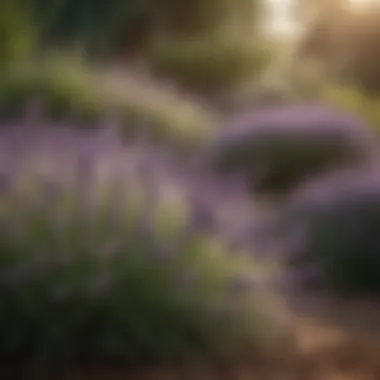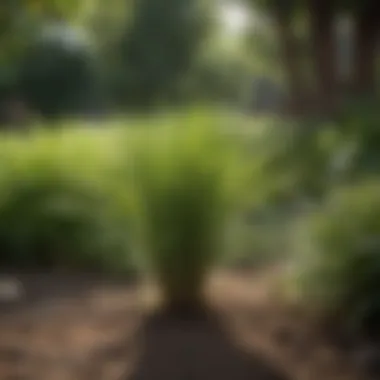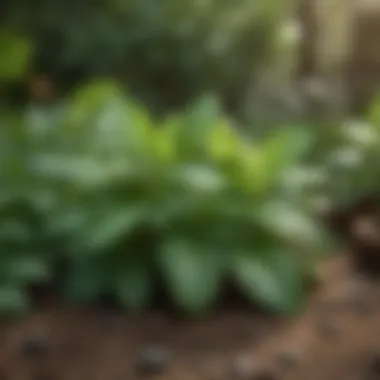Discover Plants That Naturally Repel Mosquitoes


Intro
This exploration focuses on a unique intersection of aesthetics and utility: plants designed to combat mosquito populations. Many individuals may not consider how greenery can contribute not only to visual allure but also to environmental functionality. Integrating specific plant species into outdoor spaces can be an efficient way of keeping mosquitoes at bay, all while enhancing the style and atmosphere of luxurious settings.
Outdoor Decor Ideas
In luxurious outdoor environments, the use of mosquito-repelling plants serves dual purposes. Not only do they provide pragmatic advantages, but they also enable creative expressions of style.
Seasonal Inspirations
When selecting plants, consider the seasonal dynamics of your region. For warmer climates, examples such as lemongrass and citronella thrive in summer months. They do require ample sunlight and well-draining soil to reach their full potential. In contrast, options like lavender and marigold not only repel mosquitoes, but also bring fragrant blooms into your outdoor decor.
Furniture Selection
Choosing furniture for an outdoor setting should harmonize with the selected plants. Opt for natural materials such as wood or rattan which complement the organic vibe essential to your ensemble. It places emphasis on the surroundings while ensuring a comfortable atmosphere for gatherings.
Decorative Lighting
Lighting plays a key role as well. Utilize soft glow options like solar-powered lanterns. These choices create an inviting ambiance wile being a sustainable alternative. When placed among mosquito-repellent plants, they amplify beauty while arguably offering a degree of pest deterrence.
Plant Arrangements
Strategic plant arrangements can enhance both functionality and beauty. Grouping basil, rosemary, and spearmint can not only harness their pest-repelling properties but add layers of texture to your outdoor space.
Hardscaping Solutions
Consider interspersing hardscaping elements, such as stone pathways, with your plateg arrangements. This blend of materials and flora provides visual contrast while allowing for improved drainage, key for maintaining healthy plant life.
Sustainable Practices
Incorporating ethical and sustainable practices is crucial. With the right knowledge about each plant’s needs, you can minimize water usage and foster growth without reliance on chemical measures. It fosters an ecosystem beneficial to both plants and humans alike.
Mosquitoes can disrupt even the most lavish gatherings. Integrating pest-repelling plants enhances both outdoor functionality and beauty.
Outdoor Entertaining
Combining luxury with practicality, outdoor spaces serve as ideal settings for entertaining. When planning events amidst nature, consider how integrating plant life can elevate the experience.
Hosting Luxurious Gatherings
Mega gatherings benefit from a balance of beauty and utility. Positioning tall lemongrass near dining areas can immediately evoke a sophisticated feel. Visibility of lively greenery may also lead your guests to feeling more connected to their environment.
Party Planning Tips
Plan gatherings around blooming seasons. For instance, hosting an event during the late summer allows for butterflies to linger around bee balm and catnip, reinforcing the vibrant atmosphere and natural dynamics of your evening.
Al Fresco Dining Trends
Al fresco dining creates transcending atmosphere. Using plants, like decorative geraniums and candytuft, not only invite comfort but encourage casual conversations that naturally glossy blend luxury with relaxation.
Exclusive Destinations
Engaging the senses remains pivotal in our quest for luxurious experiences that revolve around nature.
Hidden Gems
Take note of secret gardens or resorts that emphasize natural aesthetics complemented by strategic plant choices.
Luxury Resorts
Luxury resorts increasingly focus on integrating native plant life as part of their outdoor experience. Plants provide natural shading and beauty, enticing guests to linger longer in outdoor areas filled with fresh fragrance.
Private Villas
Curated outdoor spaces within private villas underscore exclusivity. By carefully choosing a blend of beautiful and repellent plant species, owners maintain serenity while pursuing indulgence in lavish lifestyles and events.
Travel Guides


Experiences around the world offer insights into sustainable designs incorporating natural elements as decor. This reinforces an understanding that prominent outdoor environments often embrace intuitive plant strategies.
Cultural Experiences
Investigate local markets and communities that specialize in native flora. Exploring culture through plant life allows for unique personal encounters while garnering useful knowledge about sustainable gardening.
Culinary Adventures
Local cuisine often incorporates herbs known to deter mosquitoes. Engaging in gastronomic adventure can merge distinctly regional humans with mindfulness in environment.
Shopping Escapades
Shop from high-end boutiques that focus on sustainability in their offerings. Look for plants known not only for charm but also practicality; environments promoting such products connect customer experiences in ethical consumption.
Home and Interiors
Pointing our attention toward domestic environments emphasizes the elegance relevant to unique decor arrangements.
Interior Design Trends
Bringing outdoor plants into interior spaces is trend that correlates well with increased vitality. It brings inside the freshness while maintaining the seamless texture of luxurious decor.
Home Organization
Efficiency in home organization encourages intentional plant selection. Understanding their potential living betterment can enhance living experiences well beyond managing insect invites.
Smart Home Innovations
Utilizing modern technologies can result in adaptations of living spaces that act in more conservative harmony with plants. Investing in smart irrigation environments mixes perception of luxury living with sustainability concerns quite effectively.
Prelims to Mosquito Repelling Plants
Mosquitoes are notorious for their insufferable bites and potential role in transmitting diseases. As they thrive in various climates, their presence can significantly hinder outdoor enjoyment. This has created a growing interest in finding effective methods to repel them, particularly through the use of plants known for their defensive properties. Such an approach offers both practical and aesthetic benefits for garden enthusiasts and designers alike. Through understanding the significance of mosquito control, one can appreciate how employing natural botanical solutions can enhance outdoor spaces.
Understanding the Importance of Mosquito Control
Controlling mosquito populations is essential for various reasons. Firstly, beyond mere discomfort, mosquitoes can transmit serious diseases such as West Nile virus, Zika, and malaria. Maintaining an environment with reduced mosquito activity boosts health safety for families and guests alike. It wwill notinte only offer a more enjoyable experience during outdoor activities but can possibly prevent serious health risks.
Secondly, in an ecological context, mosquitoes serve as indicators of environmental health. High populations may suggest local stagnation in water and conditions conducive to species expansion. Therefore, controlling their presence aids not only in public health but also in maintaining ecological balance. Using natural solutions means working with the environment rather than imposing potentially harmful chemicals, emphasizing sustainable practices.
The Role of Natural Solutions in Modern Gardens
The integration of natural mosquito repellents has found its place in modern gardening. Today’s gardening enthusiasts, especially in the luxury segment, feel an urgency to create sustainable and healthy outdoor spaces. Utilizing plants as a natural deterrent aligns with the principles of organic gardening and sustainability. Plants that emit specific scents act as natural repellents, creating a multi-sensory environment that is safe and enjoyable.
Moreover, these botanical choices enhance aesthetic appeal. Well-chosen plants can not only compensate for pest issues but also beautify a space. Varieties like citronella grass, lavender, and basil add fragrance and lushness. Arranging these plants effectively can yield striking visual landscapes while ensuring pest control. Thus, embracing such solutions transcends mere functionality in gardens and contributes to artistry, appealing to high-end clientele seeking balance between usability and beauty.
Furthermore, adopting mosquito-repellent plants is part of a more extensive trend toward eco-friendly solutions and a holistic approach to garden design.
Key Botanical Defenses Against Mosquitoes
Plants serve as natural deterrents to mosquitoes, an aspect often underappreciated in landscaping choices. Using botanical defenses not only supports aesthetic appeal but also provides functional advantages. This section will explore notable plants that effectively repel these pests.
Citronella: The Signature Mosquito Repellent
Citronella is perhaps the most recognized plant when it comes to mosquito control. This tall grass, belonging to the genus Cymbopogon, releases a strong scent that masks other attractants like carbon dioxide and body heat. The oil extracted from citronella is a key ingredient in many commercial repellents, as research supports its effectiveness.
Benefits of Citronella:
- Provides continuous protection during open-air gatherings.
- Low maintenance as it can be grown in pots or directly in soil.
- The appealing aesthetic of long grass provides character to the outdoor space.
Lavender: More Than Just a Fragrant Herb
Lavender is not just esteemed for its scent; it contains compounds that mosquitoes find repulsive. Its primary component, linalool, drives these pests away effectively. While sitting near a lavender plant, one can experience its calming aroma, while enjoying bites avoided.
Considerations for Lavender:
- Prefers well-drained, light soil and full sun exposure.
- Can be included in many flower arrangements enhancing visual appeal
- The dried flowers can be used in home décor or sachets, promoting additional uses.
Basil: A Culinary Companion with Added Benefits


Basil, often favored in kitchens, serves a dual purpose as a mosquito repellent. Genovese basil and other varieties can deter pests effectively due to their oil content. Growing basil in a garden doesn’t only enrich it—each harvest of this herb enriches numerous culinary dishes.
Key Aspects of Basil:
- Grows well in sunny locations and thrives in warm weather
- Regularly harvesting leaves cultivates stronger growth.
- Easily grows alongside tomatoes, elevating the garden’s usefulness.
Rosemary: A Hardy Plant with Pest Deterrent Qualities
Rosemary is a fragrant shrub known for its resilience, as it can survive in less-than-ideal conditions. Its chemical makeup offers more than seasoning; it repels mosquitoes, creating an extra barrier against unwanted buzzing.
Features of Rosemary:
- Requires minimal watering once established
- Can be tentatively clipped preserving desired shape
- The culinary uses extend its praise far beyond pest prevention.
Peppermint: A Versatile Herbal Ally
Peppermint holds a strong fragrance that not only entices but repels. This robust herb releases menthol, an oil that mosquitoes regard unfavorably. It is easy to grow in gardens or pots, and its aroma uplifts the atmosphere around. Its applicability transcends its main role as a mosquito repellent.
Advantages and Tips for Peppermint:
- Thrives best in partial shade, adaptable to diverse arrangements
- Can deter varying pests, not limited to mosquitoes alone
- Harvesting retains good growth; it can enhance tea, syrups, and more.
With a lush array of options available, selecting the right botanical companions helps in remarkably reducing mosquitoes in any luxury outdoor space.
Less Common, Yet Effective Plant Options
In the realm of pest control, more common plants like citronella and lavender receive substantial attention. However, this article emphasizes less common plants that can also detour mosquitoes effectively. Each of these species brings unique qualities, to address various garden choices and aesthetics. Integrating these plants offers enhanced options for those looking to maintain a comfortable and outdoor setting while ensuring sustainable practices. This section will explore their characteristics, growth habits, and overall contributions to a mosquito-repelling sanctuary.
Marigolds: Bright Blooms with Protective Qualities
Marigolds are not just visually striking; they possess inherent properties that elevate their gardening value. Known for producing natural compounds, marigolds have been recognized to emit chemicals that specifically repel mosquitoes and other garden pests. Their strong scent acts as a barrier in the environment, deterring not only mosquitoes but also aphids and nematodes, making them multi-functional allies in pest control.
The bright blossoms contribute significant culinary and therapeutic uses in gardens too. Growing marigolds isn't demanding; they flourish under full sunlight and prefer well-drained soil. Ensuring proper spacing will prevent overcrowding and promote healthy growth while allowing air circulation—a beneficial aspect for plant health.
Catnip: Nature's Hidden Gem
Often disregarded in favor of flashier plants, catnip warrants attention for its mosquito-repelling efficacy. Nepeta cataria releases a natural oil called nepetalactone, which is a powerful repellent against these pests. Surprisingly, studies have shown it can be even more effective than DEET, a common chemical repellent. This inconspicuous plant thrives in adaptable conditions, from full sun to partial shade.
Beyond pest-repelling attributes, its leaf structure and compact size make catnip an attractive ornamental plant. Growing and maintaining catnip is straightforward, needing minimal care after establishment. Its dual role as both pest deterrent and cat magnet makes it a compelling option for a diversified garden approach.
Geraniums: Decorative and Functional
Geraniums blend aesthetics with practicality, often revered for their ornamental qualities. However, varities like the citronella geranium have characteristics that make them effective against mosquitoes. This plant can emit citronellal, which imparts a fragrance humans find pleasant but aversive to mosquitoes.
Caring for geraniums requires full sunlight and well-drained soil. They require moderate watering, making them suited for various environmental conditions. Their resilience also aids their placements in diverse luxury gardens, offering both visual appeal and pest management. Often used in landscaping designs, they provide that necessary balance between beauty and function.
Lemon Balm: A Footnote in Pest Resistance
Lemon balm appears unobtrusive at first glance, yet it possesses individualized functionality against mosquitoes. This herb's strong aroma resembles that of lemon, a scent which most creatures either dislike or cannot approach. Although lesser-known, lemon balm releases compounds that deter not only mosquitoes but other insects like ants and flies.
Lemon balm thrives in direct sunlight or partial shade, and it's resilient, which fits ample growing environments. It’s vital to note that this plant can spread aggressively; thus, keeping it regulated within a designated region has its benefits. Used on terraces and outdoor spaces, lemon balm not only contributes to pest management but adds aesthetic value alongside its culinary properties.
Summarily, integrating less common mosquito-repelling plants allows garden enthusiasts a wider range of options for both pest management and visual appeal in their outdoor hubs. Cohesively blending practical and delightful elements into luxurious spaces requires savviness in plant selections.
By embracing Marigolds, Catnip, Geraniums, and Lemon Balm, achieving that delicate balance of beauty alongside functionality becomes straightforward!
Cultivating a Mosquito-Repelling Garden
Creating a mosquito-repelling garden is more than just planting a few highlighted herbs. It serves a practical purpose while enhancing the outdoor space's aesthetics. Integrating certain plants can provide significant benefits by naturally mitigating the presence of mosquitoes. Furthermore, a thoughtfully planned garden creates an inviting environment. Hence, garden lovers need to pay attention to growth conditions, watering needs, and seasonal care to maximize both beauty and effectiveness.
Choosing the Right Location for Planting
The first step is choosing an appropriate location for your mosquito-repelling plants. They thrive best in spots that experience full sunlight for at least six hours a day. Good air circulation will help keep plant foliage dry and reduce the attraction of mosquitoes. It is wise to avoid shaded and damp areas, as these provide perfect breeding conditions for the pests. Placing repelling plants near gathering spaces, like patios or decks, can enhance protective effects. Consider placing them in pots as well, allowing for different arrangements throughout the seasons.
Soil and Watering Needs
Soil quality impacts the health and effectiveness of your mosquito-repelling plants. Most of these plants prefer well-draining soil rich in organic matter. Adding compost can significantly improve soil structure and nutrient levels. Depending on the plant species, watering requirements will vary; generally, it's best to keep the soil moist but not waterlogged. A consistent watering schedule promotes strong growth while also helping to ensure that essential oils are produced in quantities sufficient to repel insects.


- Summary of watering strategies:
- Water early in the morning or late evening.
- Check moisture by inserting a finger into the soil.
- Adjust frequency depending on weather conditions, such as rain.
Seasonal Tips for Optimal Growth
Understanding the seasons in your region is critical for long-term success. Each plant will have its own peak growing season, often coinciding with warmer weather. Regularly monitor your plants, especially during the spring months, to ensure they establish well. For many plants, pruning is helpful in late summer or fall to promote denser growth, which enhances their repellent qualities. Besides, it's worth considering companion planting, too; positioning plants with mutual benefits can enhance each other's growth and resistance.
- Key considerations include:
- Utilize mulch to keep soil moist and cool.
- Remove dead leaves and stem debris to deter affected drainage.
- Plan planting off regular maintenance to ensure each plant receives necessary inputs at the right times.
"A well-maintained mosquito-repelling garden empowers your environment. It enables an enjoyable outdoor space without the looming nuisance of mosquitoes."
Integrating Plants into Luxurious Outdoor Spaces
Integrating plants into luxurious outdoor spaces creates an environment that balances aesthetic appeal and practicality. In today's world, where the concern over mosquito-related discomfort grows, these plants that repel mosquitoes become valuable assets.
Establishing a lush garden filled with appealing flora serves many purposes. First, plants like citronella and lavender not only contribute to beauty but also act as strategic barriers against these pesky insects. An outdoor space mixed with enjoyable greenery becomes essential for gatherings and relaxation. The visual enjoyment combines with natural pest control properties. Selecting the right plants considers beauty, function, placement, and maintenance.
Designing Aesthetic Gardens with Functionality
While the beauty of a garden draws the eye, functionality ensures it serves its purpose all the time. The joy of blanching in a relaxed environment can be tempered by mosquitoes. To create gardens that marry aesthetics with efficiency, consider the following elements:
- Plant Placement: Grouping mosquito-repelling plants near gathering spots creates a natural barrier.
- Color Schemes: Choosing plants with delightful colors enhances mood while thwarting pests.
- Height Variations: Incorporating plants at different heights adds visual dynamics. Taller plants can provide shelter from direct sunlight while also working to keep mosquitoes at bay.
- Texture Diversity: Using varied leaf textures increases interest and maintains garden vitality.
While designing, one must think about the natural ecology of the area. Conscious decision-making helps create habitats that are harmonious with their surroundings.
Creating Outdoor Retreats that Repel Mosquitoes
Creating comfortable outdoor retreats means providing cozy spaces that encourage people to enjoy nature and tranquility. Here are some methods to accomplish that:
- Seating Areas: Whether it’s patio furniture or loungers, shelter these structures with protective plants like lemongrass or geraniums.
- Water Features: A small fountain or pond may invite inviting wildlife while simultaneously deterring mosquitoes if plants around them have repellent properties.
- Hammocks or Shade: A relaxation spot off the ground enclosed by repellant plants will naturally keep pests away. Vertically growing plants along pergolas maximizes this option.
- Fire Pits: Arranging seating around outdoor fire pits, coupled with aromatic herbs surrounding, make evenings pleasant, minimizing mosquito attraction.
Integrating mosquito-repelling plants into outdoor arrangements provides double benefits: comfort and beauty. Focusing equally on aesthetic design and pest control leads to resilient gardens. Such eco-friendly solutions grant us environments that enrich lifestyles, cater to leisure moments, and respect nature.
Proper plant choice and layout will create zen-like access to relaxation without the pain of bug bites.
As we explore ways to enhance outdoor spaces through natural means, consideration of overall garden intention and appearance forms a luxurious experience steeped in a culture of comfort.
Limitations and Considerations
The topic of limitations is fundamental when discussing plants that fend off mosquitoes. A comprehensive approach to mosquito repellent plant selection necessitates understanding both their strengths and constraints.
First, the effectiveness of mosquito-repelling plants varies significantly based on species. Some plants, such as citronella, have garnered widespread recognition for their strong repellent properties. However, others may prove less efficacious, making it essential to choose wisely. The local ecosystem also influences the success of these plants—native species generally adapt better and perform more effectively than non-natives.
Effective management begins with knowledge of the species available. When selecting plants, consider both their pest-repelling attributes and their ability to thrive in your particular environmental conditions.
Effectiveness Variability Among Different Species
The efficacy of mosquito-repelling plants fluctuates markedly across species. While certain botanicals, like lavender and peppermint, are recognized for their aromatic properties that deter mosquitoes, their intrusiveness can lead to variable results depending on specific conditions. Factors such as soil quality, sunlight, and local climate dramatically impact how robustly these plants can develop their natural defenses against mosquitos. Research points out that while neem and basil may be beneficial, their capacity to repel often diminishes in environments they are not accustomed to.
In general, create A healthy ecosystem—deriving benefits from these plants necessitates a synergy among surrounding flora. This interaction might lead to enhanced growth and influence the plants' effectiveness.
Integrated Pest Management Approaches
While relying solely on plants might be considered a pure form of pest control, an integrated pest management approach often yields better results. This type of management emphasizes combining différentes strategies to manage pest populations effectively.
Incorporating botanical pest herbs along with other tactics can optimize protection. Here are some effective strategies:
- Regular Monitoring: Stay vigilant on mosquito activity. Knowing when populations spike is pertinent for deploying sufficient countermeasures.
- Complementary Measures: Phsyical barriers like nets and proper drainage improve plant defense capabilities. Dense foliage works not just as a beauty enhancer but creates favorable habitats for fiestas and predatory insects.
- Education on Habitats: Understanding mosquito life cycles and breeding environments can ensure that growth focuses not only on repellent plants but also eradicates problem areas.
Integrating these principles can create robust outdoor spaces where luxury meets beleaguered functionality. This enriches the garden aesthetics while statistically lowering mosquito presence.
The End
In examining the role of plants that repel mosquitoes, several critical elements emerge from this exploration of botanical defenses. The usage of natural solutions against mosquitoes is not only a commendable choice but also a practical one, integrating ecological responsibility with contemporary gardening practices.
Summary of Key Insights
Throughout this article, we have seen that certain plants carry potent properties against mosquitoes. From citronella to lavender, the manifold benefits of these plants extend beyond merely serving as a deterrence to these pests. They showcase the potential of enhancing outdoor environments while aligning with sustainable ecosystem practices. Understanding their cultivation needs means readers can confidently install them into existing layouts or new designs.
Encouragement for Sustainable Practices
It is paramount to appreciate the commitment to sustainable gardening. By choosing mosquito-repelling plants, you contribute to maintaining biodiversity and adds value to your luxurious outer spaces. Simple tactics like integrating these plants into patio decor or creating standalone gardens can enrich personal spaces without resorting to synthetic repellents. Commitment to such practices favorably reflects not only an appreciation of nature but aligns with many high-end lifestyle agendas aimed at preserving the environment.







